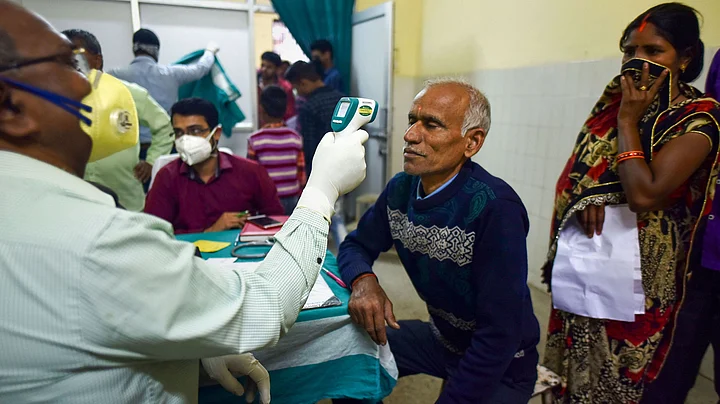While relatively developed states like Maharashtra, Kerala, Tamil Nadu and Karnataka have witnessed sudden spike in number of positive Coronavirus cases in the last two weeks, states like Bihar, Jharkhand, Odisha and Assam seem to have bucked the trend.
These states have reported positive cases in low single digits or less despite significant size of migrant population.
Have the people in these states developed, what is known as, ‘herd immunity’ and therefore less susceptible to deadly Coronavirus that has created havoc all across the world, including the most developed countries like the US, UK, France and Germany? Let us hope so, even though we don’t have any scientific evidence to suggest that.
Are these states doing enough number of tests to ascertain the spread of virus? The answer is, no. It looks like these states are more focused on buying time rather than checking the spread of virus. Hence, fewer tests perhaps so that poor health infrastructure is not stretched beyond a point.
Do these states lack significant linkages with areas which have now been designated as hotspots and therefore less likely to have positive cases? The answer, in this case too, is emphatic no.
Less Developed States Have Strong Linkages with Areas Now in the Grip of Outbreak
A 2007-08 National Sample Survey Organisation (NSSO) findings on domestic migration pattern clearly establishes that people from Jharkhand, Odisha and Bihar are known to migrate out of their respective states for better employment opportunities.
And anecdotal evidence, based on what we see at railway stations, bus terminals and airports across the country, suggests that the trend has only got accentuated in the years following the publication of the NSSO survey data.
Commenting on the NSSO data, Arvind Panagariya, well known economist and former Vice Chairman of the NITI Aayog, writes: “In terms of out-of-state but within-India outmigration, Bihar leads the way. An impressive 61.8 percent of its out-migrants are residents in other states…Other states with high proportions of out-of-state migration are Delhi, Jharkhand, Uttarakhand and Orissa.” (Source: The New Bihar edited by NK Singh and Nicholas Stern, 2013)
The data shows that the people from Bihar, Odisha and Jharkhand do have significant linkages with parts that are now in the midst of Coronavirus outbreak. It is very likely that people residing in now designated hotspots would have travelled back to their home states before the countrywide lockdown came into effect. Scores of people from Delhi, Mumbai, Hyderabad and Bengaluru are reported to have gone back to these states even after the nationwide lockdown announcement.
It is therefore imperative that these states should have done significantly more testing than what has been done so far.
Number of tests in Bihar, Odisha, Jharkhand way below the national average
According to a Hindustan Times report (March 31), Jharkhand, with just 196 tests which works out to 5.9 tests per million population, is way behind the national average of 31.7 tests per million population. Bihar and Odisha are only marginally better with 7.6 and 8.8 tests per million population respectively. Kerala, on the other hand, has conducted nearly 200 tests per million population. Even Rajasthan has conducted many more tests than the national average. Delhi, Tamil Nadu, Karnataka, and Rajasthan are some of the other states that have bettered the national average in terms of testing.
Why have less developed states shown unwillingness to augment testing capacity? One possible reason could be the rationing of testing kits. They are being used sparingly and only in cases where risks of exposure are quite high.
However, the other reason, and more likely perhaps, could be the inadequacy of health infrastructure in these states that cannot take any load beyond a point. Incidentally, states that have gone for more tests have better infrastructure while the ones with fewer tests have serious deficiency in terms of hospital beds or trained manpower.
According to a Brookings paper, Bihar, on an average has just one government hospital bed per 10,000 population. Jharkhand has 3, Odisha has 4 and Assam has 5. On the other side of the spectrum are states like Kerala, Karnataka and Tamil Nadu with figures of 10, 11 and 11 respectively. The paper argues that “while demand is being kept down by behavioural interventions such as social distancing etc. supply of beds and critical care equipment like ventilators needs to be quickly ramped up.” Bihar and other less developed states perhaps have tried to keep the demand low. Without sounding alarmist, let us ask ourselves whether buying time is the right approach to deal with Coronavirus.
The reason why health infrastructure is so dismal in states like Bihar, Jharkhand and Odisha is because of very low public health expenditure. Bihar spends a paltry Rs 491 per capita on public health which is one of the lowest in the country. The figures for Jharkhand and Odisha stand at Rs. 866 and Rs. 927 respectively. Kerala’s per capita expenditure on health stands at Rs. 1,463 and Karnataka’s at Rs 1,124, according to National Health Profile, 2019.
An overnight change in the health infrastructure is unlikely in the less developed states. The least they should do now is to test more and judiciously use whatever is available while working simultaneously on augmenting capacity.
The menace called Coronavirus visits once in ages. The response to fight it should also be equally swift and decisive. There is no other way left now.
(Mayank Mishra is a senior journalist who writes on Indian economy and politics, and their intersection. He tweets at @Mayankprem. This is an opinion piece and the views expressed in this article are that of the writer’s own. The Quint neither endorses nor is responsible for the same.)

